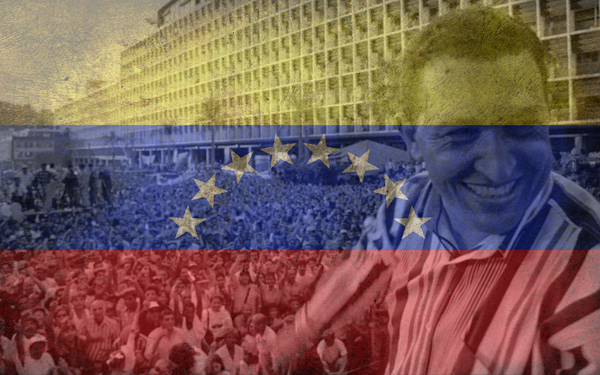Photo by: Henoc Kivuye
After two years of battling cancer, Venezuelan President Hugo Chavez died on March 5.
To many Venezuelans, the news came as a tragedy. Tens of thousands of people lined the streets as Chavez’s body was carried from the military hospital in the capitol city of Caracas where he died to the Military Academy. There his body laid in state until his funeral on March 8.
Restaurants and shops closed in Caracas, and the nation instigated a seven-day mourning period.
Chavez had battled cancer for nearly two years. A new respiratory problem is hypothesized to have weakened him. Venezuelan Vice President Nicolas Maduro said that the cancer may have been introduced by enemies and accused United States diplomats of trying to organize a revolt against the military.
Chavez won his fourth political campaign in 2012 but was never sworn in due to his failing health.
Chavez gained widespread support as president, especially with the poor. Utilizing Venezuela’s vast oil money, Chavez implemented social programs such as public housing, health clinics and education programs. The poverty level significantly declined during Chavez’s reign.
“Chavez’s failure to Venezuela was primarily economic,” said junior Afton Paris. “He over-cultivated the oil trade, which cannot sustain the Venezuelan economy forever, and continues to suppress the poor. Although poverty rates have fallen in Venezuela, the economy cannot survive that way forever.”
Oklahoma Christian University has several students from Venezuela currently attending the school, including junior Angel Nisi.
“He wasn’t a good president at all,” said Nisi, who grew up under Chavez’ reign. “Before Chavez, Venezuela was a good country, economically safe, people with jobs, safe and secure.”
Chavez stepped into the limelight in 1992, when he attempted a coup revolution – which failed – at the then-president, Carlos Andres Perez.
Chavez was elected in 1998, and his initial policies were considered moderate. However, as time went on, his positions became increasingly radical, and he described himself as anti-imperialistic and anti-capitalist.
Chavez’ political progression transformed from a social democracy to what he called “Socialism of the 21st Century.” Chavez led a social revolution throughout Venezuela, supported a leftist movement across Latin America and was openly anti-United States.
Chavez was an ardent admirer of Cuban leader Fidel Castro. After Castro passed the reign to his brother Raul, Chavez became the U.S.’s biggest contender in the Western Hemisphere.
In addition to idolizing Castro, Chavez’s list of friends was rather dubious in U.S. terms – Mahmoud Ahmadinejad in Iran, Muamaar Qaddafi in Libya and Iraq’s Saddam Hussein.
Not all citizens were fond of Chavez’s policies, however. Those in opposition – mainly the upper-to-middle class and the wealthy, deemed him a dictator, emulating Castro. In 2002, he was thrown in jail in a blood-free coup in an attempt to rid him of his power.
“He is the reason why so many people left the country,” Nisi said. “He tried to make a socialism revolution by making all the people poor, just like the Russians and Cubans did.”
Although social programs improved under Chavez’s reign, crime rates were not as fortunate. Homicides almost doubled, and kidnappings became more frequent.
“Now it is the most dangerous country in the world,” Nisi said. “It is sad to say, but not even in Iraq die so many people daily, and they are in war. We have a rate of 60 people dying a day because he gave weapons to the poor people. In his 15 years as a president, about 160,000 people died.”
Diplomatic relationships between the U.S. and Venezuela have been rocky, but Chavez’s death may be the key to a fresh start.
“I think the U.S. will try to construct a new relationship, although it will be difficult since there hasn’t been a U.S. ambassador there since 2010,” Paris said.
With the swearing in of a new president, Venezuela has the U.S.’s support in promoting democratic principles and human rights, according to the White House.
“Hugo Chavez was a destabilizing force in Latin America and an obstacle to progress in the region,” Rep. Mike Rogers, the chairman of the House Intelligence Committee, said in a recent interview. “I hope his death provides an opportunity for a new chapter in U.S.-Venezuelan relations.”
More than 30 world leaders attended Chavez’s funeral. Three religious leaders led prayers, including American civil-rights activist Jesse Jackson.
The streets resembled a carnival atmosphere, with vendors selling replicas of Chavez’s presidential sash and the military conducting marches.
Over two million people passed by Chavez’s coffin. It will be on permanent display in the Caracas military museum where Chavez was captured in his 1992-failed coupe.
The campaign process for a new president is in full swing, yet no clear front runners have risen. Before his death, Chavez encouraged the citizens to support Maduro. His rival for the presidency will most likely be Chavez’s former opponent in the 2012 election – Miranda state Gov. Henrique Capriles.












Be First to Comment